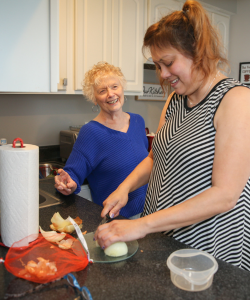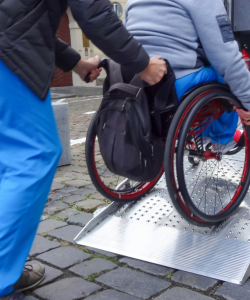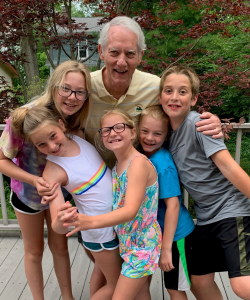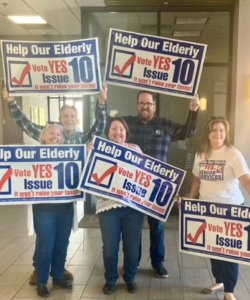Below are the full success and client stories from the Hamilton County Elderly Services Program (ESP) 2022 Annual Report. These stories illustrate the impact ESP has on older adults and caregivers in Hamilton County.
Click here to view the program’s 2022 annual report. To request a paper copy, email us.
New app helps ESP clients get in-home care services, despite national aide shortage

Donna had recently retired from a job at a nonprofit when a friend encouraged her to reach out to the Elderly Services Program (ESP) for help. She was dealing with balance issues related to diabetes and neuropathy. Through ESP, she was eligible for an emergency response system and home-delivered meals. She was also eligible for the program’s home care assistance service, which includes help with housekeeping, personal care and other household tasks.
However, Donna enrolled in ESP at a difficult time. Because of a national shortage of homecare workers, Donna and other clients often wait weeks – or even months – to be matched with an aide from a homecare agency.
Council on Aging (COA), ESP’s administrator, has been working to find solutions to this problem. Over the last decade, COA has held focus groups with homecare aides, adjusted requirements for service providers, and tested new service models, all with the goal of providing reliable, quality care.
One area where COA saw success was in providing opportunities for clients to hire their own aides. Called consumer directed care, this care model allows clients to hire someone they know – usually a friend, neighbor or someone in their social circle – to provide their care. The client acts as the employer and the individual they hire is their employee. ESP pays for services approved in the client’s care plan. While this requires a more hands-on approach for clients, satisfaction levels in the program are high because clients have more control over their care.
But, many ESP clients who could benefit from consumer directed care do not know anyone they could hire to provide the care they need. These individuals have been left to wait until an aide can be identified through a local service provider.
Enter AddnAide. Council on Aging and its subsidiary, home52, launched AddnAide in July 2022 after four years of development. AddnAide is an app (available online and downloadable through traditional app stores) that helps ESP clients match with people in the community who are available to provide homecare services. It’s an expansion of consumer directed care in that it gives clients with limited social circles an opportunity to find and hire an aide.
That’s how Donna connected with her aide. After enrolling in ESP, Donna’s care manager told her about consumer directed care and AddnAide. Together, they decided it would be worthwhile to give AddnAide a try.
Donna was one of the first ESP clients to use AddnAide. Her care manager set up her account in AddnAide, including details about her care plan, and then Donna completed her profile by adding additional details such as the days and hours she preferred to receive care, as well as the type of help she needed (all within the scope of her ESP care plan). She was particularly interested in finding someone to help her with cleaning and organizing. The combination of neuropathy and poor eyesight often left Donna unsteady on her feet. The thought of bending down to scrub her shower floor really frightened her. “It’s hard for me to do everything I’d like to do on my own,” Donna said.
With her profile complete, AddnAide helped Donna identify aides who matched her service needs. She exchanged messages with a few aides and then connected with her current aide, Lorinda. After they texted and spoke on the phone about her care needs, Donna said she knew Lorinda would be a good fit. The variety of services Lorinda was available to help with was appealing – especially cleaning and organizing.
One of the goals of AddnAide is to expand the pool of individuals available to serve older adults who need in-home care. Targeted marketing has been helping to achieve that goal, attracting people like Lorinda to AddnAide. Based on successful gig economy models used by companies like Uber, AddnAide is ideal for individuals who want flexibility in their work schedule, including stay-at-home parents, retirees, those with other employment and students. It’s also ideal for community-minded individuals who want to give back while supplementing their income.
Lorinda joined AddnAide in August 2022 after seeing an ad on Facebook. She’d been doing gig work since leaving a full-time retail position. AddnAide appealed to her because it’s like gig work, but the financial details, including taxes, are all managed in the app. She even clocks in and out within the app as she comes and goes from clients’ homes.
Lorinda also liked the flexibility AddnAide offered – it was easy to fit into her schedule along with work she was already doing with Instacart and Amazon Flex. “You’re your own boss, set your hours, choose who you want to work for,” Lorinda said. “It’s freedom from the 9 to 5.”
Lorinda provides care for three ESP clients via AddnAide. When choosing who to work for, Lorinda looks at the type of care they need and always meets them before accepting the job. “It’s important for me to have a good relationship with my clients,” she said.
For example, while Lorinda does not want to provide personal care, she is more than willing to help with cleaning, organizing, running errands, prepping meals and cooking, or just providing companionship – all services most ESP clients need.
During their first meeting, Donna and Lorinda walked through the house and discussed Donna’s needs. Lorinda helps Donna with a variety of tasks, including heavy cleaning, changing bed linens and organizing.
“I don’t want to feel like I’m just sitting around not doing anything, because I can do things,” Donna said. “I do my laundry, sweep and take care of the cats.”
But she acknowledges that having Lorinda available means she doesn’t need to take unnecessary risks. “It’s all the little things she does,” Donna said. “It’s nice to have the help.”
For Lorinda’s part, she enjoys working with older adults and making connections. She recognizes that her clients don’t have much support in their lives. “Some weeks, it’s just me and the meals on wheels driver my clients see,” she said, adding, “This job feeds my soul, my spirit. Not just my wallet.”
Donna, Lorinda and other users have shared feedback about their experience with AddnAide. For example, based on suggestions from clients and aides, COA and home52 made changes to the required background check process (for aides) and began offering in-home support to help ESP clients get started in the app. Educational materials have also been added and improved over time.
Donna was a caregiver for her own mother before dementia made it necessary to move her into a care facility. She understands how hard it can be to take care of someone else, and she also knows many older adults have no one to take care of them.
“There is such a need,” Donna said. “Not everyone has family – or family who wants to help.”
Donna would encourage other ESP clients who are waiting for in-home help to try AddnAide. “It’s not as intimidating as I thought it would be,” she said of using AddnAide and hiring her own aide. “I trust Lorinda so much. It’s very comforting to know you have someone who cares. And I’m speaking from a position of not having family to help. Give it a try.”
Positive attitude, reliable ride help cancer patient on road to recovery

Battling cancer for a number of years and no longer able to drive to her appointments, Mary called Council on Aging (COA) for assistance.
Today, Mary is enrolled in the Hamilton County Elderly Service Program and receives transportation to her chemotherapy treatments. Her rides are coordinated through home52 Transportation.
home52 Transportation coordinates multiple transportation providers through a centralized transportation coordination center, providing on-demand and advance-scheduled trips for riders like Mary, who require specialized transportation services. home52 Transportation was created by Council on Aging and its subsidiary, home52. It launched in May 2021.
When Mary needs to schedule a ride, she calls home52 Transportation’s call center. “Everyone is delightful and helpful,” Mary said of the call center staff. “The day before my appointment, I receive a reminder call. This is beneficial. I like to have my clothes laid out the night before and pack a lunch. My treatment lasts all day.”
On appointment days, Mary receives a call to let her know her ride is on the way. “This provides the time I need to grab my lunch, head to the garage and position myself in the wheelchair,” she explained.
If a ride is running late, coordinators in the home52 Transportation call center reach out to clients to let them know. If the client is going to an appointment and will be late because of a transportation delay, call center staff reach out on the client’s behalf to ensure they will still be seen at their appointment when they arrive.
Most of Mary’s rides to her chemotherapy appointments have been provided by home52 Transportation provider, 360 Total Care. Rodger is one of her regular drivers. “He is a delight and I enjoy our conversations,” said Mary, adding that her ride is always on time. She is especially grateful when it’s Rodger who returns to pick her up when her treatments are finished.
home52 Transportation is different than other transportation systems, including public transit and rideshare services. These traditional systems do not always meet the transportation needs of older adults and individuals with disabilities.
“The individuals who ride with us need hands-on support,” said home52 Transportation program manager, Bryan Black. “They need someone to collect them at their door, assist them safely into and out of the vehicle, and then to assist them into their appointment location. In many cases, our drivers are also managing the rider’s equipment, such as walkers, canes and wheelchairs.”
This is what makes the difference for Mary, especially after a long day of treatment. “I have a smile on my face when I see Rodger return to pick me up,” she said. “At my home, Rodger opens the garage door and wheels me in. He knows I’m very weak. He stands behind me, provides an arm so that I may lift myself up from the wheelchair, and he’s right there when I step into my home.”
Exhausted from her treatment, Mary can often be heard singing Amazing Grace or chanting as she makes the short trip from her garage into her home. She said, “This provides the motivation I need to place one foot in front of the other.”
As Mary’s needs have changed over the years, her Elderly Services Program care manager, Deanna, has helped, ensuring Mary has the support she needs so she doesn’t miss treatment. And, Mary recently reported to Deanna that her treatment is working. “Thank goodness,” she told Deanna. “COA got me there. Thank you for the support and mostly the transportation.”
Read more about home52 Transportation.
Laundry service lightens the load for client during recovery from illness

When suddenly sidelined by new physical limitations due to illness or injury, many older adults find themselves in unfamiliar territory, requiring help to take care of themselves and their households, even if only during their recovery period.
Kent, 75, found himself in just this situation after becoming critically ill from sepsis due to a tumor obstructing his bowel. Taken to the hospital by ambulance, he underwent surgery, which resulted in a week on a ventilator and an ileostomy – an alternative way for the digestive system to eliminate waste into an external bag. He also suffered multiple strokes.
After 43 days of treatment and rehabilitation, Kent was able to return home to fully recover and began to receive temporary supportive services through Council on Aging’s (COA) FastTrack Home program, which is available in Hamilton County via the Elderly Services Program (ESP).
“We knew he did a ton of stuff around the house and most of the cooking,” Kent’s daughter Colleen said. She and her two siblings help their father and his wife as much as they can, but none of them live close by, and they have jobs and families to tend to as well. “Trying to juggle all that has been quite challenging,” Colleen said.
Through FastTrack Home Kent receives home-delivered meals and limited housekeeping assistance and grab bars were installed in his bathroom upon his arrival home from the hospital. But perhaps most helpful of all is the laundry service he receives.
The tumor that resulted in Kent’s surgery was from cancer he has lived with since 2013. The cancer caused chronic digestive issues, and with the ileostomy, Kent was dealing with ongoing incontinence. “This causes a ton of laundry,” Colleen said. “The sheets have to be changed almost daily.”
Traditionally, assistance with laundry and other housekeeping through ESP and FastTrack Home is provided by home health aides employed through home health agencies in Council on Aging’s provider network. Due to a critical aide shortage in COA’s service area and the nation, COA clients are experiencing disruptions in these services. Some clients must wait weeks or even months for an aide.
To get around this, COA has sought innovative ways to help its clients get the assistance they need. Clients who are physically unable to do their laundry may now choose to use a laundry service provider, rather than waiting for an aide to become available. In Kent’s case, there were only very limited aide hours available to him, so his COA care manager offered the laundry service as an option to enable the aide to focus on other housekeeping tasks.
This new laundry service model is available to ESP and FastTrack Home clients. The service picks up dirty laundry and linens and returns them clean and folded. Clients have a range of detergents to choose from and can receive text and email reminders about their service. So far, 55 clients have opted to try the service, and their feedback has been overwhelmingly positive.
“Having the laundry service is amazing,” said Colleen. “They come every Monday and it sits on the porch. It disappears and comes back clean and folded. It’s been extremely helpful, especially when we’re so overwhelmed.”
Commissioners approve funding to help older adults with utility bills and home repairs
In May, Hamilton County Commissioners partnered with Council on Aging to launch the Senior Utility Assistance and Home Repair Program. The program came about after commissioners heard from older residents who were ineligible for existing assistance programs because of strict income limitations and who were feeling the impact of rising inflation. The program was funded by the county’s senior services tax levy.
“We heard from a lot of seniors who came out to the 513Relief Bus to get assistance but when they got to the front of the line, unfortunately, we were unable to help them because of the federal guidelines,” said Commission President Alicia Reece. “I’m happy that my colleagues joined me in voting unanimously to make sure seniors aren’t left behind… These types of programs are so important to keep peoples’ lights on and to keep the water running.”
The program provided $1 million to expand help to Hamilton County residents age 60 and older who met certain income requirements and who were not eligible for utility assistance through other available programs.
Utility assistance is available to Hamilton County residents through several existing programs, but none are available to older adults with an income above 175 percent of poverty – meaning older adults with an income just under $24,000 do not qualify for most existing programs.
The Utility Assistance portion of the county’s program provided a one-time credit of up to $500 towards water or gas/electric bills. The Home Repair portion of the program covered home modification and repairs such as ramps, railings, bathroom grab bars, HVAC repair or other maintenance to help older adults continue to remain living at home. Many of the home repairs resulted in ongoing savings for older adults on their monthly utility bill.
Council on Aging partnered with a local organization, Serving Older Adults Through Changing Times (SOACT), to raise awareness about the program in the community. The program was popular, serving more than 1,100 eligible older adults from May through December 2022. Most of the allocated funding went to home repairs and modifications for more than 300 county residents. The average cost of the home repairs and modifications was $3,356 per job.
Feedback from older adults who received support through program has been positive.
When I learned about the program, it was perfect timing because at my last appointment, my doctor recommended that I have grab bars installed. I very much appreciate having the grab bars installed and I feel secure when in the shower. Thank you.”
Peggy
For Mary, replacement of an old water heater also resulted in savings on her utility bills: “My water heater was over 30 years old, leaked water and was not efficient. I’m very grateful for the assistance. They were very kind and did a nice job with the water heater. Thank you.”
To manage funding for 2022 and 2023, Council on Aging started a waiting list for the program in July 2022. COA staff screened people on the waiting list for eligibility in other available assistance programs. Those found to be ineligible for other programs received assistance through the county-funded program. An additional $1 million was made available in January 2023 to serve individuals who were still on the waiting list. COA is currently exploring other funding sources for the program in 2024.
Voters continue strong support of senior services levy

As we age, most of us would like to stay in our own homes for as long as possible. But, when it comes to accessing programs and services to support independent living, where you live really does matter. For example, more than 80 percent of counties in Ohio have tax levies that provide some type of service or support to older adults, including Hamilton County.
Hamilton County’s Senior Services Levy is unique in that it provides a funding stream dedicated to helping eligible older adults in the county age in place through services such as home-delivered meals, transportation, help with housekeeping and personal care assistance. These services are available through the county’s Elderly Services Program (ESP). ESP serves older adults who might otherwise find themselves caught in the middle – with too many assets to qualify for Medicaid-funded programs, and too little to afford private care.
ESP provides a critical safety net for some of the most vulnerable members of our community and it would not be possible without the generous support of local taxpayers and voters. In November 2022, more than 77 percent of county voters approved a renewal of Hamilton County’s Senior Services Tax Levy – Issue 10. The 1.6 mill levy costs the owner of a $100,000 home about $33.97 annually.
Hamilton County voters understand ESP offers a compassionate and cost-effective alternative to nursing home care. Besides costing a fraction of the cost of Medicaid-funded care in a nursing home, ESP helps long-married couples stay together at home. It helps family caregivers struggling to balance their caregiving responsibilities with those of careers and young families. And for older adults who have no one to help them, the levy is a lifeline to independence and dignity.
In 2022, Hamilton County’s senior services tax levy helped more than 9,300 older adults. Thank you, Hamilton County voters!
Despite numerous health challenges, client remains at home with family, ESP support

It was 2006 when Patricia was diagnosed with breast cancer. On top of dealing with rheumatoid arthritis that had plagued her since her 20s, she now had to be treated for the cancer. The following years brought a second bout of breast cancer, gall bladder surgery, a knee replacement and congestive heart failure brought on by chemotherapy treatments.
You may think you know how Patricia’s story ends… with her in a nursing home. But Patricia found the Hamilton County Elderly Services Program (ESP), which has helped her continue to live in her home despite all the health challenges and her limited mobility.
Before her time with ESP, Patricia – who never learned to drive – received transportation through Maple Knoll Outreach Services for Seniors. But her husband lost his vision and passed away and she needed more help. Her Maple Knoll driver recommended she contact Council on Aging (COA).
During her time with ESP, Patricia’s services have been adjusted by her COA care manager to meet her needs at the time. Most recently, it was the installation of a walk-in shower because she could no longer safely step in and out of her bathtub.
She also gratefully remembered the time COA came to her rescue during a very hot summer when her air conditioning stopped working. “It was miserable,” she said. “And they furnished me a portable air conditioner for my bedroom.”
Patricia’s grandson, Brandon, provides her home care services through ESP’s Consumer Directed Care (CDC) option. Though CDC, ESP clients can hire their own family member or acquaintance (but not a spouse) to provide their home care services. Brandon helps his grandmother with chores around the house – taking out trash, dusting, and other things she can’t do because of her health and physical limitations.
Patricia also has support from other family members and friends, but if she didn’t have ESP she believes she would not be able to remain in her home. “My family might help me and they might not… people have their lives to live, they might have jobs, they might have other family members or kids they have to take care of,” she said.
“COA is a blessing and a lifetime of help. They make sure I can stay in my home. I’d rather be in my home than a nursing home. And COA has pretty much made that happen,” Patricia said.
